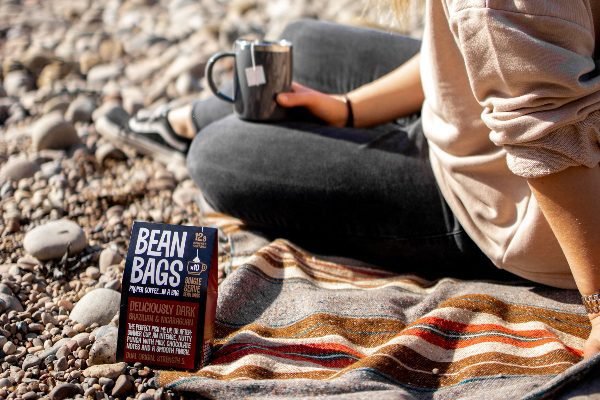Coffee bags have been around for a while – reportedly since the 1970s – but haven’t yet caught on in the way the tea bag has.
Alex puts this down to the design of the bag and the quality of the coffee; he saw the fuss-free, mess-free advantages of coffee bags and set out to create an improved product that combines the desire for top-notch coffee with the convenience of the humble tea bag.
Raw Bean’s pyramid bags provide more room for the coffee to bloom and are packed full of speciality-grade premium coffee.
The Speciality Coffee Association (SCA) recommends 55-60g of filter coffee per litre, which translates to 12g for an average-sized UK mug, so each Bean Bag contains a 12g dose of ground coffee – 50% more per bag than the market leader.
‘Having the correct ratio of coffee to water creates a full-flavoured coffee and means you don’t need to resort to darker roasts that may mask the origin’s characteristics’, Alex explains. The bags themselves are biodegradable; they are made of a plastic-free biopolymer web, derived completely from renewable plant sources.
‘Bean Bags mean that you can enjoy a speciality, freshly brewed coffee even when you are in a rush or don’t have any brewing equipment available’, Alex tells us. ‘I think they will revolutionise hotel room coffee, too.’
Coffee of the future
All Raw Bean coffees are traded in an ethical, environmental and socially responsible manner using traceable supply chains.
Once in the UK, the coffee is roasted using the most efficient equipment with the latest technology to optimise taste and flavour profiles while minimising the impact on the environment, recycling heat and using catalytic converters to manage emissions.
This year Raw Bean has started the switch to recyclable packaging film and is working on a project with FareShare UK, so a donation from the sale of each pack will help to feed people in need.
Raw Bean also supports World Coffee Research, which runs collaborative agricultural research and development projects designed to enhance farmer livelihoods and ensure coffee’s future.
‘We love coffees from South and Central America and our retail coffees are from Brazil, Nicaragua, Guatemala, Colombia, El Salvador and Honduras’, Alex tells us. ‘We work closely with our suppliers to find speciality coffees that taste great, are sustainably produced and have an interesting story.’
Like the business itself, the range at Raw Bean changes frequently to embrace new innovations, such as the launch of a new Organic Swiss Water Decaf anticipated for later this year.
As people begin to settle into new patterns for socialising and different working rhythms, it will be interesting to see what coffee’s social role will look like in the future.
‘The pandemic has changed our world radically’, Alex says. ‘With many people now working remotely, I would anticipate coffee houses will play a big role in providing valuable human interaction, a work hub and a break from the monotony of your own four walls.’
 Play Video about This Rock Might Just Save The World
Play Video about This Rock Might Just Save The World Play Video about Play 2 hours of rock
Play Video about Play 2 hours of rock Play Video about Play 2 hours of brook
Play Video about Play 2 hours of brook Play Video about Play 2 hours of sheep
Play Video about Play 2 hours of sheep











































